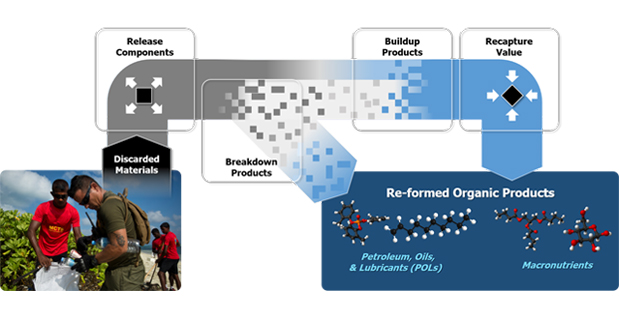Bextine diseñó el programa para cubrir dos escenarios que se han vuelto cada vez más comunes e importantes para las fuerzas armadas: operaciones expedicionarias conducidas por tropas de las Fuerzas de Operaciones Especiales y operaciones de estabilización de “Fase Cero”, como ayuda en caso de desastres y asistencia humanitaria.
 The tremendous ability of the U.S. military to project power entails an equally imposing logistical chain to maintain stocks of food, water, medicines, fuel, and other supplies critical to troops and equipment. That chain gets stretched to extremes when the military is called upon to rapidly deploy anywhere in the world and sustain operations without the benefit of fixed infrastructure. ReSource, the newest program from DARPA’s Biological Technologies Office, sets out to revolutionize how critical supplies are procured, by using self-contained, integrated systems to convert military waste into chemical lubricants for weapons and machinery or even into food and water. The overriding goal of the program is to create systems that can rapidly produce materials onsite, when and where they are needed.
The tremendous ability of the U.S. military to project power entails an equally imposing logistical chain to maintain stocks of food, water, medicines, fuel, and other supplies critical to troops and equipment. That chain gets stretched to extremes when the military is called upon to rapidly deploy anywhere in the world and sustain operations without the benefit of fixed infrastructure. ReSource, the newest program from DARPA’s Biological Technologies Office, sets out to revolutionize how critical supplies are procured, by using self-contained, integrated systems to convert military waste into chemical lubricants for weapons and machinery or even into food and water. The overriding goal of the program is to create systems that can rapidly produce materials onsite, when and where they are needed.
“In a remote or austere environment where even the basics for survival can’t be taken for granted, there can be no such thing as ‘single use,’” said program manager Blake Bextine.
Bextine designed the program to cover two scenarios that have become increasingly more common and important to the military: expeditionary operations conducted by Special Operations Forces troops and “Phase Zero” stabilization operations such as disaster relief and humanitarian assistance. In both cases, troops could feed commonly available, mixed waste such as the wrappers from military MRE packets into the envisioned ReSource system and select the output depending on need.
A successful ReSource system will be capable of completing three main processes: breaking down mixed waste, including recalcitrant, carbon-rich polymers like those in common plastics; reforming upgradeable organic molecules and assembling them into strategic materials and chemicals; and recovering purified, usable products. In the case of food, the ReSource output would be a basic product composed of macronutrients ready for immediate consumption.
“We hope to give troops the ability to extend their time in field, expand their operational flexibility, or stabilize at-risk populations by taking advantage of almost any resource on hand,” Bextine said. “Even in otherwise barren locations, we could make it possible to forage for waste that can be broken down and converted into emergency rations or other critical supplies.”
While ReSource systems are intended to be user-friendly black boxes to their military users, the internal mechanisms will be fueled in part by a combination of biomolecules and natural and/or synthetic microbes. Biologists on the program will engineer biological systems to safely and controllably thrive in the presence of complex mixed waste. DARPA anticipates that successful systems will blend mechanical, biological, and chemical catalytic approaches.
DARPA has set several standards for ReSource technology that, if achieved, could fundamentally improve how the Department of Defense approaches waste management, shifting away from burning, burying, and shipping burdensome waste to onsite material conversion of waste from a less valuable form to a strategic resource. First, DARPA intends for ReSource systems to require little energy, process nearly any type of energy-dense waste, and run continuously once started. Second, the output will be variable and can be reprogrammed to fit a specific need. Third, the ReSource system will be scalable, with smaller, portable systems designed to support small groups of forward-deployed troops by producing macronutrients or lubricants, and larger systems — similar in size to a shipping container — able to support operations in urban environments by producing food and water for hundreds to thousands of people.
Researchers interested in learning more about the ReSource program should consider attending the DARPA Proposers Day meeting on August 29, 2019, in Phoenix, Arizona. Details are available at: https://go.usa.gov/xyJ6u. DARPA anticipates that successful teams will include expertise in biochemistry, engineering, and bio-inspired systems, among other areas of study.
A forthcoming Broad Agency Announcement will be posted to FedBizOpps.gov and include program objectives, schedules, and metrics.
Fuente: https://www.darpa.mil

